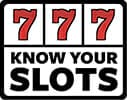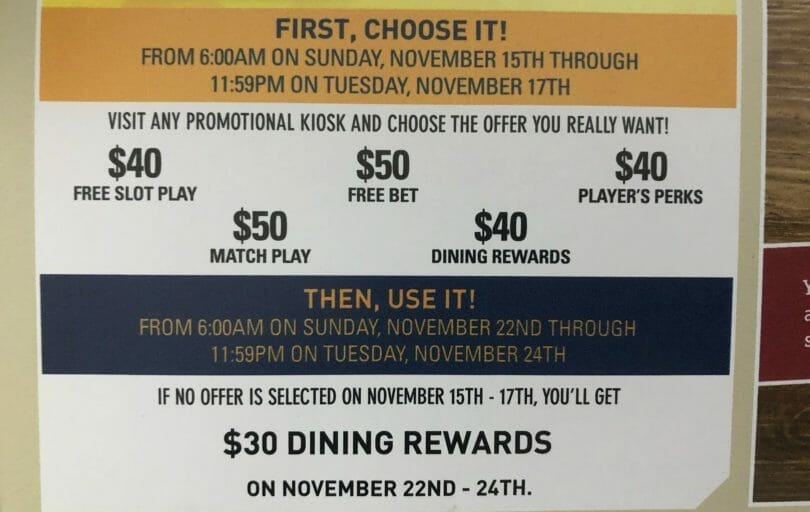I had this question recently come in on Twitter which I thought was a good one, and wanted on today’s post to elaborate more on my thoughts that I shared as a reply. Let’s start with the question:
Last month I brought with about 1000 to Vegas. I play slots, enjoy it etc. Compared to my previous visits I spend more on slots. Got back home and my offers for the next trip decreased. Any help?
There are a variety of reasons that comps can move in a different direction than you’d anticipate after a casino visit. I’ll go over the core potential reasons here, with the caveat that each casino handles offers differently, so I can only theorize as to what may have caused the downward shift.
Coin-In/Out vs. Actual Win/Loss
Even if your budget went up, to the casino you may not have played as much as before. That’s because there’s the concept of coin-in/out vs. actual win/loss. The former is how much in total wagers you placed; the latter is the final amount you actually won or lost based on your wagers.
Many casinos build offers off of coin-in/coin-out vs. actual win/loss, which rewards those who play slower and steadier vs. those who might swing for the fences and lose big fast. The reason for this is, over time, if you make more wagers, you are more and more likely to donate to the casino vs. the casino donating to you.
Sometimes casinos will factor win/loss in as a secondary layer, but usually in their favor – if you are winning too much, they’ll knock your comps down since the winnings were enough, in their mind. It’s crummy, but it happens.
Your Trip Length
If you spent more, but also spent more time there, you could be watering down your play in a different way – reducing your daily average. Many casinos calculate your play based on the number of gaming days you’re on site, and develop a daily average. This is generally understood to be how Caesars has historically handled this, through an average daily theoretical (ADT) calculation.
Other casinos will calculate based on a trip, and your comps will basically be balanced around that. Vegas Mlife and Cosmo are more in that bucket, and so the entire offer (room nights, free play and food and beverage) are pooled together as a trip offer based on how much they expect you to spend on a trip, and how much in comp value they’re willing to extend you.
What You’re Comped vs. Play
If the casino gives you a certain level of comps, but believe you got more than you were supposed to, some will reduce your next round of comps to calibrate for this. If you had a nicer room, say a suite, vs. a regular room, they’ll calculate that differently in their comp value issued to you, as an example.
You’ll usually see what they value the room at when you book it, but that may be the retail value vs. the casino value, so that number in and of itself is just a helpful relative guide to see the cost differences between room types.
How Often a Casino Updates Offers
The drop in offers could be something that was already going to happen before your recent play, and your recent play may not be incorporated yet.
I’ve seen a very wide delta in how quickly a new visit hits casino offers – some places seem to be able to react within a day or two, especially when it comes to things like bounceback offers; others take months, as much as three months at times, to reflect that visit. A month is probably average, given most casinos issue monthly offers.
One Visit May Not Be Enough
Your one increased visit may simply not be enough if you have a more entrenched history. If you had a good visit (or more) drop off, and you only played once at a newly higher level, it may simply not be enough to move the needle the way you’re hoping.
However, if you haven’t played that much at a property, every visit will carry proportionally more weight accordingly, and casinos have various ways of aging older visits, which may work in favor of those players whose play increases iwth time.
Other Casino Factors
Sometimes seasonality and peaks and valleys can determine changes in comp offers. If casinos aren’t struggling to pull people in, and bookings are high, comps such as rooms can be hard to secure. Particularly as bean counters take firmer and firmer hold of more casinos and casino companies, casinos that are particularly busy may see other types of comps pruned as well.
New ownership, such as Eldorado’s purchase of Caesars and other casino properties in recent years, has led to comps being cut in many cases as well; I still distinctly recall when they acquired Tropicana in Atlantic City and many peoples’ comps were instantly slashed by 50 percent or more.
I realize this isn’t a specific answer to the question, but the question is also very broad, and so I’m aiming to cover as many angles as I can with my response.








Another reason is an industry change (in my neck of the woods) to use rolling 3 month cycle versus previous rolling 6 month cycle. The goal is to reward more active guests.
If you haven’t visit in a while, or had a big trip 4+ months ago, the offers will drop immediately.
Thanks! That’s a good point about how offer parameters themselves can have an impact. I think in the question asker’s case, they might actually benefit if their recent play is higher than their historic average, since they’d be getting measured more on their better recent play. But if you haven’t played in awhile, or your recent play’s been below the average, this would certainly hit you harder!
Here’s an actual example from one of my casinos. Suppose I had a huge coin in (or action) month for November. Yet my December offers decline big time. It turns out my Dec offers were based of Aug – Set – Oct. it doesn’t include November because my Dec offers were sent out in the last week of November so my November action was not taken into consideration.
Yeah, that makes sense. Effectively it’s a variation on when casinos update offers, but adding in the question of what date range are they evaluating for that set of offers. I’ve certainly seen even slower than what you’ve outlined, so it’s quite possible for a delay to exist before that play is recognized.
I think the casino has an algorithm, tracking your play, and the more likely you will visit next month, the less free play they’ll offer; the less likely you are to come to the casino next month, the more free play you’ll be ‘awarded’
Hey Richard! In general, that does factor into the math. Imagine two players who have a budget to go to the casino of $100 a month. One goes weekly and spends $25; another goes once a month and spends $100. The casino will calculate the former as a $25/visit player, and the latter a $100/visit player, and the offers would be adjusted accordingly. Some casinos may take visit frequency as a whole into account for offers and adjust accordingly too.
In this scenario, the player simply played more on a visit, and yet got less comps. As a rule, that shouldn’t happen unless something else was going on as well. Could it be visiting more often? Perhaps, but I think if they visited more often AND played bigger, the casino would tend to reward that – it gets them exactly what they want.